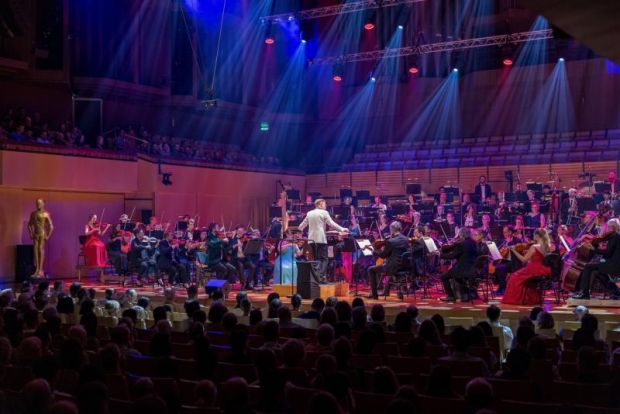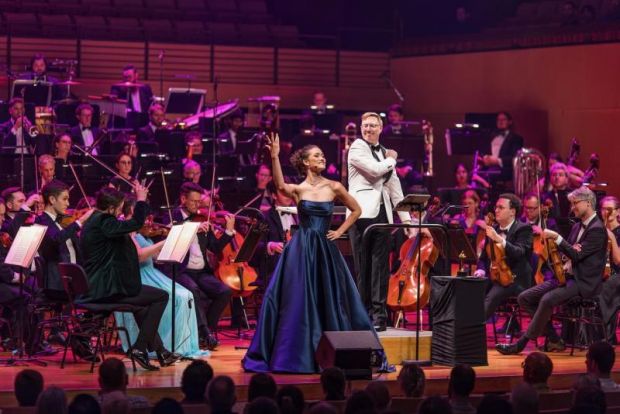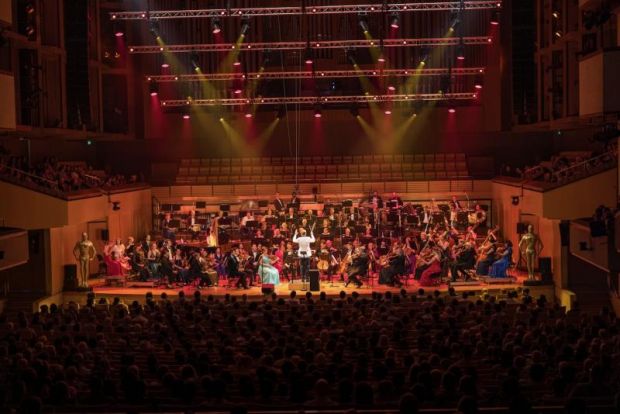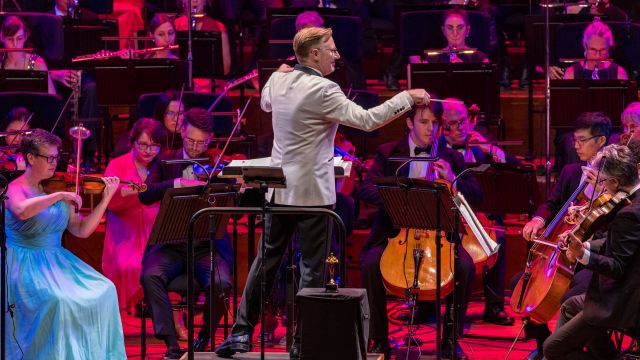Cinematic - The Oscars
A new instalment of movie music lit up the stage this week, continuing the Queensland Symphony Orchestra’s eclectic 2025 season this time with veteran conductor/compere Benjamin Northey once again at the helm. Designed to be a crowd-pleasing concert of colour, flair, and nostalgia, with the orchestra dressed in a spectrum of vibrant attire under the atmospheric and ever-changing lighting design, the audience was soon whisked away on a cinematic journey through sci-fi, fantasy, musicals, and more. Adding to the mix was Nina Korbe, a talented Queensland Conservatorium graduate whose voice brought warmth and vitality to numbers from The Sound of Music, Wicked, and West Side Story, the latter a fitting choice given her past performance as Maria with Opera Queensland.

Being a film-music concert, the stage was packed to bursting, the percussionists taking over the back row like a small army. The sound that followed was equally immense — rich, full-bodied, and at times physical. You could feel the resonance travel through the floorboards, a testament both to the orchestra’s sheer power and to the QPAC Concert Hall’s superb acoustics. The audience, a healthy mix of all ages, responded well to those instantly recognizable themes from Star Wars or Titanic bringing smiles of recognition across the hall.
The program read like a roll-call of cinema’s musical legends: John Williams, of course, James Horner, Howard Shore, Hans Zimmer, John Barry - a remarkable talent - and Michael Giacchino - the latter relatively unknown to the general public but deserving every bit of recognition here. Musicals were well represented too, with selections by Richard Rodgers - one of my all time favourites - Leonard Bernstein, Alan Menken, and Stephen Schwartz, composer of Godspell, Pippin and of course Wicked which continues to captivate audiences both on stage and soon again on the screen for part 2. It was also heartening to see works by Rachel Portman — the evening’s sole female composer — beautifully programmed alongside a piece by Japan’s Joe Hisaishi. Between items, the conductor offered light-hearted introductions and anecdotes, adding a sense of playfulness to the proceedings (and even coaxing a bit of audience participation).

When one is a regular concert goer, one can compare orchestral works from all musical eras thereby providing the opportunity hear the difference between a good orchestrator and a great one. Many film composers use orchestrators to flesh out their ideas, when there's time or a suitable budget at hand, and I continued to notice in this concert possible evidence by just listening to the final result. For example, James Horner had the remarkable ability to write haunting melodies (Legends of the Fall, a beautiful score which captures the essence of the movie so deeply with its themes but where the orchestration is a little thin, often relying on a large string section, as in his arrangement of the Titanic Suite in this concert). But I do know he often had very tight constraints to complete some of his scores (sleep being pretty much no-no) and it's a shame the talents of a good Hollywood orchestrator wasn't brought on board. Look at the output of John Williams - he had some very fine orchestrators at hand though he did most of the work in his sketches. Even outside of film, you can see the same dynamic - think of Stephen Sondheim and his orchestrator Jonathan Tunick, whose work transforms already-clever material into something transcendent. In this way, the concert doubled as a quiet celebration of the behind-the-scenes artisans whose names rarely appear above the credits but whose influence is profound.

If I had one quibble, it’s that I could do with a little less Star Wars and Lord of the Rings - not a great score in my opinion - and so on (I know, heresy!), and a little more exploration of the lesser-known gems of the genre. That said, it’s hard not to be swept up in the grandeur of it all especially when the James Bond music blazes out in all its brassy, syncopated glory: good to hear music from the franchise with its huge output over the years, slow evolvement and use of a variety of composers/arrangers; and of course that Bond theme, and its orchestration, is a touch of genius. While this year’s presentation perhaps leaned less on the theatrical patter and costumery of previous QSO movie nights, it was still an enjoyable evening. For many in the audience — perhaps even a few young aspiring musicians — it may well have sparked the same love of orchestral music that drives concerts like this in the first place.
In the end, the concert wasn’t just a night of nostalgia; it was a reminder of the artistry, collaboration, and craftsmanship behind the scores that have shaped our collective imagination. And as always, the QSO proved more than up to the task of bringing that magic to life.
Brian Adamson
Subscribe to our E-Newsletter, buy our latest print edition or find a Performing Arts book at Book Nook.

